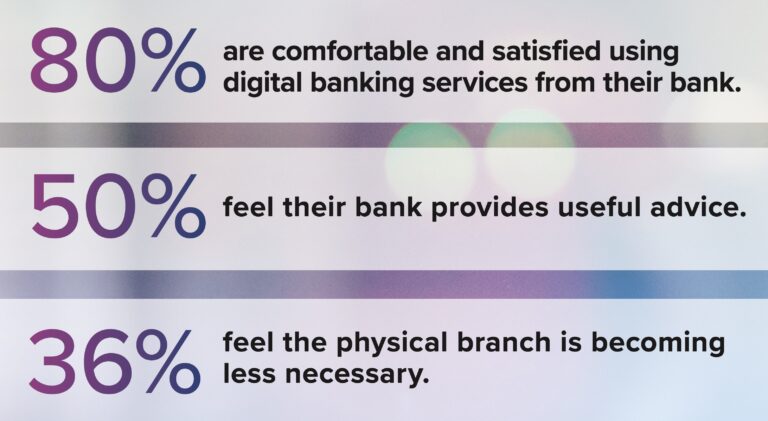
The digital transformation sweeping Western society demands forward-thinking investments in the face of economic pressures, a new report from GFT argues.
“The urgency to innovate to prepare for an uncertain future, while still achieving short-term returns on investment, is growing,” the report reads.
Global digital transformation company GFT surveyed Canadians to gauge the state of fintech in the country. They found more than three-quarters of Canadians are comfortable and satisfied using digital banking services from a mobile device. Only two-thirds trust their bank to manage personal data, however, with just half willing to share data in order to save more money.
Canadians are “comfortable with the basics of digital banking” but are “not unlocking its full potential,” according to the report. Physical interactions, which apparently now even includes “phone calls,” are still relied on by customers for “complicated or non-routine” banking processes—which GFT believes represents a “clear opportunity” for banks to produce greater digital services to clients.
One way to further digital banking in Canada is to advance open banking, which the report says “is still a work in progress” for our country. Open banking, as an emerging trend in financial services, lets consumers securely share their financial data between banks and accredited fintechs, thereby fostering a more personalised banking experience.
But a recent survey by the Financial Consumer Agency of Canada confirmed that Canadians’ awareness and understanding of open banking remains low, despite the Canadian government’s strides toward implementing this financial innovation.
According to the FCAC’s survey results, only 9% of Canadians had heard of open banking. 52% of the survey respondents claimed they wouldn’t use it. A further 29% remained uncertain, while a mere 15% indicated their interest in utilizing open banking services. Overall, Canadians distrust new fintech.
But how much does this really matter? It depends.
If we pry “adoption” from “awareness,” we may be able to more accurately target resources toward advancing open banking in Canada, experts posit. Increasing adoption of open banking is of course essential but some argue that maximizing awareness of specific details around open banking may be misdirected energy.
For example, implementing consumer protection measures within the open banking framework would likely increase adoption, according to the report, which is good. These measures included full protection from losses, the ability to revoke data sharing consent at any time, reporting of data breaches, and enforcement of standard security requirements.
Interpreting the findings, experts at business law firm McMillan emphasized that while adoption of open banking is critical, awareness may not be so. Just like not every consumer knows the detailed processes of banking services like wire transfers, they don’t necessarily need to understand every nuance of open banking to benefit from it.
Low awareness may also be temporary, as it is trending upward.
A framework for open banking tailored to the Canadian context is expected to be unveiled by the end of this year, promising exciting developments in the Canadian financial sector.
In addition to open banking, GFT believes artificial intelligence-powered tools, such as conversational chatbots, will also prove critical to improving digital-based customer service in finance.


Leave a Reply